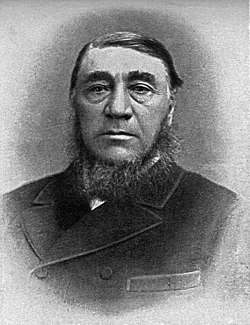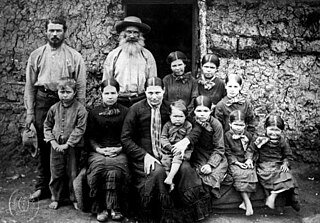
Boers are the descendants of the proto Afrikaans-speaking Free Burghers of the eastern Cape frontier in Southern Africa during the 17th, 18th, and 19th centuries. From 1652 to 1795, the Dutch East India Company controlled Dutch Cape Colony, but the United Kingdom incorporated it into the British Empire in 1806. The name of the group is derived from Trekboer then later "boer", which means "farmer" in Dutch and Afrikaans.
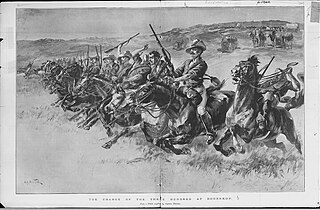
The Jameson Raid was a botched raid against the South African Republic carried out by British colonial administrator Leander Starr Jameson, under the employment of Cecil Rhodes. It involved 500 British South Africa Company police launched from Rhodesia over the New Year weekend of 1895–96. Paul Kruger, for whom Rhodes had great personal hatred, was president of the South African Republic at the time. The raid was intended to trigger an uprising by the primarily British expatriate workers in the Transvaal but it failed.
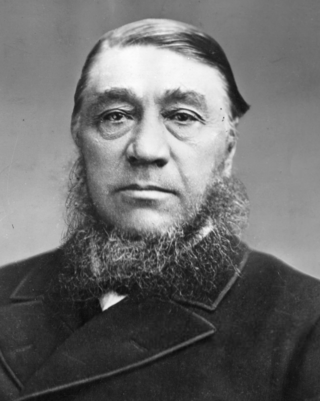
Stephanus Johannes Paulus Kruger, better known as Paul Kruger, was a South African politician. He was one of the dominant political and military figures in 19th-century South Africa, and State President of the South African Republic from 1883 to 1900. Nicknamed Oom Paul, he came to international prominence as the face of the Boer cause—that of the Transvaal and its neighbour the Orange Free State—against Britain during the Second Boer War of 1899–1902. He has been called a personification of Afrikanerdom and admirers venerate him as a tragic folk hero.

The Day of Reconciliation is a public holiday in South Africa held annually on 16 December. The holiday came into effect in 1995 after the end of apartheid, with the intention of fostering reconciliation and national unity for the country. Recognising the need for racial harmony, the government chose the date for its significance to both Afrikaner and indigenous South African cultures. The celebration of the Day of Reconciliation can take the form of remembering past history, recognising veteran's contributions, marching, and other festivities.

The Afrikaner Broederbond (AB) or simply the Broederbond was an exclusively Afrikaner Calvinist and male secret society in South Africa dedicated to the advancement of the Afrikaner people. It was founded by H. J. Klopper, H. W. van der Merwe, D. H. C. du Plessis and the Rev. Jozua Naudé in 1918 as Jong Zuid Afrika until 1920, when it was renamed the Broederbond. Its influence within South African political and social life came to a climax with the 1948-1994 rule of the white supremacist National Party and its policy of apartheid, which was largely developed and implemented by Broederbond members. Between 1948 and 1994, many prominent figures of Afrikaner political, cultural, and religious life, including every leader of the South African government, were members of the Afrikaner Broederbond.

Orania is an Afrikaner nationalist town in South Africa, founded by Afrikaners. It is located along the Orange River in the Karoo region of the Northern Cape province. The town is split in two halves by the R369 road, and is 871 kilometres (541 mi) from Cape Town and approximately 680 kilometres (420 mi) from Pretoria. Its climate is semi-arid.

A Volkstaat, also called a Boerestaat, is a proposed White homeland for Afrikaners within the borders of South Africa, most commonly proposed as a fully independent Boer/Afrikaner nation. The proposed state would exclude Afrikaans-speaking Coloureds but accept South Africans of English ancestry and other White South Africans, if they accept Afrikaner culture and customs.

The Reverend Stephanus Jacobus du Toit was a controversial South African nationalist, theologian, journalist and failed politician. In his younger years Du Toit did much to promote the Afrikaans language as a symbol of Afrikaner nationalism. Apart from the years 1882-8 when he was Superintendent of Education in the South African Republic, he lived in or near the town of Paarl in the Cape Colony. Disillusionment with the Kruger regime led him, in later years, to moderate his views. He was instrumental in initiating the translation of the Bible into Afrikaans and was a proponent of the Afrikaans language. He died an outcast.
Heroes' Day or National Heroes' Day may refer to a number of commemorations of national heroes in different countries and territories. It is often held on the birthday of a national hero or heroine, or the anniversary of their great deeds that made them heroes.

The Day of the Vow is a religious public holiday in South Africa. It is an important day for Afrikaners, originating from the Battle of Blood River on 16 December 1838, before which about 400 Voortrekkers made a promise to God that if he rescued them out of the hands of the approximately 20,000 Zulu warriors they were facing, they would honour that day as a sabbath day in remembrance of what God did for them.

Afrikaner nationalism is a nationalistic political ideology created by Afrikaners residing in Southern Africa during the Victorian era. The ideology was developed in response to the significant events in Afrikaner history such as the Great Trek, the First and Second Boer Wars and the resulting anti-British sentiment that developed among Afrikaners and opposition to South Africa's entry into World War I.
Kleinfontein is a culturally segregated, Afrikaner-only settlement near Pretoria, South Africa that was founded in 1992. Members of the African National Congress and Democratic Alliance youth have denounced the settlement and the continued existence of Afrikaner-only settlements in post-Apartheid South Africa.
Afrikaners are a Southern African ethnic group descended from predominantly Dutch settlers first arriving at the Cape of Good Hope in 1652. Until 1994, they dominated South Africa's politics as well as the country's commercial agricultural sector.

Founders Day or Van Riebeeck's Day was a formal public holiday of the Union of South Africa and the Republic of South Africa until 1994.
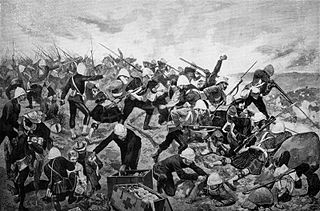
Majuba Day(Afrikaans: Majubadag) was a major annual national celebration on 27 February in the South African Republic in the period between the First and Second Boer Wars. The day was named after the Battle of Majuba Hill where on 27 February 1881 the main battle of the First Boer War took place.
Bittereinderdag is celebrated annually on May 31 by Afrikaners, commemorating the Boer Commando guerillas known as Bittereinder who fought during the Second Boer War.
Balmoral is a town in the Emalahleni Local Municipality in the Mpumalanga province of South Africa. The village was established as a railway station of the Oosterlijn from Pretoria to Maputo in 1894. The village and railway station were erected at the farm Eenzaamheid. For decades the village was nothing more than a railway stop with a primary school for the surrounding farms. During the Second Boer War, the British built a concentration camp near the railway station.
Boerehaat is an Afrikaans word that means "ethnic hatred of Boers" or Afrikaners as they became known after the Second Boer War. The related term Boerehater has been used to describe a person who hates, prejudices or criticises Boers or Afrikaners.

The Statue of Paul Kruger is a bronze sculpture located in Church Square in Pretoria, South Africa. The statue depicts Paul Kruger, the Boer political and military leader and President of the South African Republic from 1883 to 1900, and four unnamed Boer soldiers. The Statue of Paul Kruger was sculpted in 1896 and was installed in its current location in Church Square in 1954.
The Orania Representative Council is the local municipal representative council in the Northern Cape province of South Africa that governs the Afrikaner-town of Orania in the Pixley ka Seme District Municipality. During the implementation of a new municipal system in South Africa in 2000, the Orania Representative Council was the only representative council that was not abolished. Therefore, the Orania Representative Council is the only municipal body that still uses the old (pre-2000) municipal structure, based on the Local Government Transition Act of 1993.
